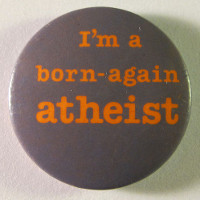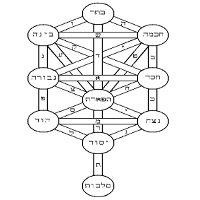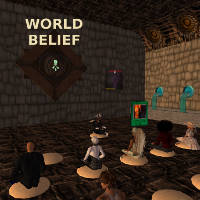-
No God

First off, atheism isn’t nihilism. Atheists don’t deny beliefs as a whole. Atheism is an opposition to ideas that people attribute to life, concepts of Gods and the supernatural. They have many views on the subject so it isn’t a unified belief, and atheism could be considered more a state of mind than a formalized…
-
Evolution Wants a God?

There are schools of occult thought that use deistic reasoning. That paranormal functioning is possible in any way, because any divinity meant it as providence for human support rather than it taking an active and arguably meddlesome hand. This is another atheistic argument. God gave us the hammer? Yes. It’s argued that in the presence…
-
What Is Is

The atheist views lack centralization or a strong professing membership for more reasons than intellectual cowardice, I think. I think though that atheism serves a useful purpose. We constructed Gods in a search for God, and found much about man. If we deconstruct Gods in a search for the truth, the principle that guides all…
-
Rites of Spring

I don’t intend to delve too deeply into any one culture or beliefs on the rites of spring, and really it isn’t very necessary. Even in the most common view of orthodox religion, spring still means the same thing. The year is sort of intuitively perceived as a cycle of life and death, and it’s…
-
Spirit of the Land

The Christ Easter story is mirrored in other religions, and it is the ultimate story of destruction and renewal. The pagan rites of kingship are heavily shown in the Celtic world, and this applied in Africa also, though the shamanic views were different from the monotheistic. Basically, it was believed that in order to truly…
-
New Beginning

Spring is a time when many new things come. If you would reject any supernatural element, then why does proper observance of spring seem to make so many things prosper? Even things supposedly unaffected by the weather? The astral is more active in spring. This is why we have spring fever, the “psychic disturbance” so common in…
-
Jewish Esotericism

The Kabbalah is Jewish esotericism. It’s a bit more widely known than people realize, and some of its arguments are arrived at and used by people who aren’t Kabbalists. The basic concept is that Gods essence is incomprehensible to us, and though Christians criticise this mysticism they still use that idea. The universe exists as…
-
Three Pillars

One of the divisive points between Judaism and Christianity is Judaism is in a sense more Gnostic. Thus Rabbis did and still do write material that is treated as valid spiritual doctrine, and they question and break down their holy cannon to see the wisdom in it. Not because they don’t believe in it, not…
-
Tree Of Life Shadow

Judaism doesn’t have any concept of hell, but the emanations in some schools of Kabbalism have a shadow aspect. The tree of life and its shadow. It’s called the tree of life because it is seen as an outgrowth of the infinite God, and the emanations arose in stages. It’s shadow element isn’t much talked…
-
Evolution of Indian Belief

I would like to start by first saying Semitic and Indian beliefs are actually closely connected. The Aryan mountain people had their own sort of diaspora and encountered other cultures, but they were not of one mind as a people. Those who migrated to Iran were more militant, while those who migrated to the Indus river valley were…
-
Karmic Place

Veneration of cows is not what people actually think it is. In India, they are resistant to consuming cattle for the same reason Christians are resistant to scrapping their crosses to be used for other purposes. The cow is seen as a living embodiment of one of their almost universal principles, ahimsa, or harmlessness. To…
-
Diversity in India

There are some parallel practices that resemble yoga in ways, but the yoga traditions are from India, and transcend specific religious creed. Sikhism arose in India. Sikhism arose as an inspiration from the moral creed of Islam, but did not espouse the cultural and militant views, nor did they adhere strictly to pacifism either. They don’t…
-
Bon Religion

Bon is a Chinese religion, loosely. It’s ethnically Tibetan, but not confined to that region of China. Bon was the native shamanism, but more like the Kahuna tradition than the Native American, and is more concerned with personal state than the spirits in general. Bon’s concern was basically the same as the Kahuna path, bridging the…
-
Abode of Spirits

The Chinese New Years celebration, their own version of the day of the dead ritual, has its origin in Bon. The new year for Bon is the same as the Chinese New Year, and their lunar calendar arose from it. The people of the lowlands were more fractured, while the tribes of the Tibetan mountain…
-
Establishment Religion

Zeitgeist means roughly “mans spirit of the age“, and their concern as a body is with the social ills we now experience. They are in a sense a party to the spiritual community, because they do have views on spirituality and religion, but they are focused more on their areas of concern than criticisms of…
-
Alternative View

Let’s use a model. Say you want my counselling (that being what I do), if you give me money how will it go? There does have to be an agreement system, but if in my example you sought my counselling so you came and gave me food, there would be a direct impact. If you came…
-
It Is Your Choice

For various reasons, we accept that we “must” from society, but we do not “have” to do anything except breathe and eat? Actually, yes we do. You won’t get to eat anything if you don’t work, or break the law. Somebody owns anything and everything you might want. It is your choice, but should you…
Category: World Belief
On my spiritual path I have studied many world beliefs. While I don’t claim to be an authority on them, I will share some of what I’ve learned in the ‘World Beliefs’ category. Perhaps they will inspire you to seek further.
Those who abandon their faith are not faithless. Perhaps quite to the contrary, their faith has given them the strength to abandon trappings. Religion from the Latin religio meaning practice. We will all have practices. I was very devout myself, and in my devotion I found I could no longer devote myself to that creed. My faith isn’t weak. It motivates my seeking. I don’t subscribe to any specific faith. I find truth in my personal experience which does loosely label me a Gnostic. Many Gnostic schools say the logos indwells our sun itself.
The Buddhas wisdom was put into the context of the greater way as was the only way it could be, but in fact the symbolism is at best intuitively true. The spheres exist within us. Wisdom is simple. It is the sign of true knowing. Not if they can spout arcane jargon, but can they take an arcane topic and make it abundantly clear to the uninitiated.
I will state that these beliefs discussed are not necessarily my beliefs.
“There is not enough religion in the world to destroy the world’s religious.” Friedrich Nietzsche

